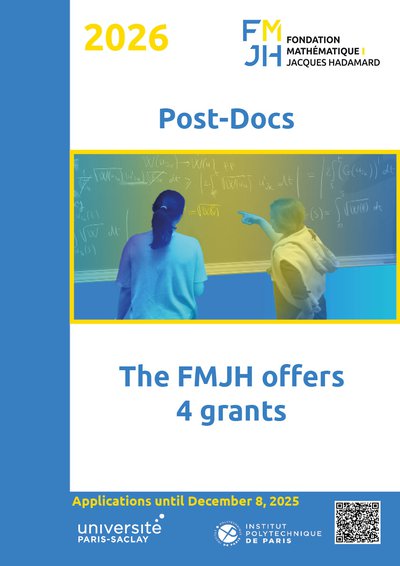Thematic post-docs
These two-year post-doctoral fellowships are aimed at young mathematicians interested in the interface mathematics highlighted in the FMJH's thematic programs. The salary is around €25,000 net per year. Successful candidates may be asked to give 20 hours a year of tutoring to bachelor's or master's students. Unless special arrangements have been made, the commitment begins on October 1 of the year of recruitment. To be eligible, candidates must have defended their thesis before October 1 of the year of recruitment.
Applications must be submitted online when the annual call for applications is issued. There are two ways to apply, depending on whether the research program is free or part of a closed list of subjects proposed by researchers within the FMJH perimeter.
Application with a free research program
In the online application form, please indicate which thematic program your application falls under. The list of these programs is given in the annual call for applications.
In addition to this indication of theme, the application file must include:
-
a curriculum vitae,
-
a research project,
-
a wish to be assigned to one of the research units affiliated to the FMJH,
-
the name of a scientific contact in the chosen laboratory,
-
a letter of motivation setting out the applicant's wishes and research program.
Application on a predefined topic
The FMJH alternately allows applications on research topics proposed by researchers within the perimeter. These subjects all fall within one of the FMJH's thematic programs. They are listed in a table that is updated each year.
The application must include, in addition to the subject to which the application relates:
-
a curriculum vitae,
-
a letter of motivation setting out the applicant's scientific background and chosen research topic.
Examination of applications
Each thematic program has a jury which examines all the applications relating to the theme in question. The four rankings thus prepared by each of the thematic program juries are then discussed and validated by the FMJH steering committee.
NB To easily identify the themes present in the various research units within the FMJH perimeter, it may be useful to consult the Interactive map on the Paris-Saclay campus.
Call for applications for post-docs 2026

Regarding applications for thematic post-docs, the research project must be clearly linked to the themes highlighted in one of the 4 thematic programs: maths in computational science and engineering, mathematical physics, maths for life sciences, optimisation and operational research (PGMO).
Applicants whose research project is more at the ‘heart’ of the mathematical discipline are invited to apply to the "Hadamard Lecturers" call for applications.
Are only considered applications coming from the following form (documents may be written in French or English). To be eligible, the candidate must have defended his/her thesis before 1st October of the year of recruitment.
Please note that recommendation letters requested directly by the FMJH to the scientific contact and the referees must be received by December 16, 2025 at the latest. Remember to submit your application well in advance so that they have enough time to submit their letter.
Deadline: December 8, 2025 at 11:59pm
The proposed research topics of the 2026 call for applications for Post-Docs are:

Recipients 2026
Thematic Programmes:
- Mathematics and life sciences:
Mrs Elisa CONTINELLI assigned to the "Laboratoire L2S" / Fédération de Mathématiques (FdM) de CentraleSupélec
- Mathematics in Computational Science and Engineering:
Mrs Margaux ZAFFRAN assigned to the Laboratoire de Mathématiques d'Orsay (LMO), Université Paris-Saclay
- Mathematical Physics:
Mrs Yingtong HOU assigned to the Laboratoire de mathématiques et modélisation d’Évry (LaMME), Université d'Evry Val d'Essonne
- PGMO:
Mr Manu UPADHYAYA assigned to the Centre de mathématiques appliquées de Polytechnique (CMAP), École Polytechnique
Recipients Archive
Exceptional Call for applications 2024
Joint post-doc Energy for Climate & PGMO
The Interdisciplinary Center "Energy for Climate" (E4C, https://www.e4c.ip-paris.fr/), together with PGMO, opened a call for a one year post-doc to work in a laboratory of Institut polytechnique de Paris.
This targets research topics in the scope of PGMO (optimization, operations research and their interactions with data sciences) with applications to energy and climate. The post-doctoral work may benefit from real data of energy consumption and production (smart buildings, agrivoltaic farm) provided by E4C. The applicants must provide a research program, and indicate in their program a contact (researcher) working in the expected host laboratory. Applicants needing advice or help to find a suitable host may contact pgmo-e4c-postdoc-info@fondation-hadamard.fr
Note that owing to the specific origin of the funding (E4C), the set of eligible hosts (laboratories of IP Paris) differs from the one of the general post-doctoral call of FMJH (laboratories affiliated to FMJH).
Laureate: Mr Nguyen Minh Hieu affected to Laboratoire d'Informatique de l'École Polytehcnique (LIX)
